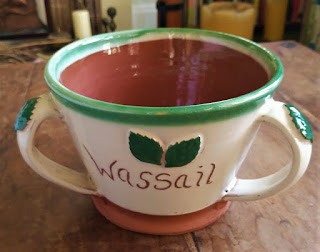"The mid-winter tradition of wassailing... falls into two distinct categories: the house-visiting wassail and the orchard-visiting wassail. The house-visiting wassail is the practice of people going door-to-door, singing and offering a drink from the wassail bowl in exchange for gifts... The orchard-visiting wassail refers to the ancient custom of visiting orchards in cider-producing regions of England, reciting incantations and singing to the trees to promote a good harvest for the coming year."
 I've blogged quite a bit about toasting the apple trees, so here I'm going to write more about seasonal hospitality. The exact date when friends, family and neighbours would share a wassail bowl varied from Christmas Eve through to Twelfth Night, or even a bit earlier or later. A traditional punch shared was mulled ale mixed with roasted apple pulp, called lambswool. Professor Ronald Hutton, in The Stations of the Sun, writes that wassail bowls didn't necessarily only hold booze. They could contain milk or fruit. The custom was about charity as well as friendship, as it could be carried around by carol singers who would offer songs as well as a sip of ale to householders they visited, expecting coins or gifts in return.
I've blogged quite a bit about toasting the apple trees, so here I'm going to write more about seasonal hospitality. The exact date when friends, family and neighbours would share a wassail bowl varied from Christmas Eve through to Twelfth Night, or even a bit earlier or later. A traditional punch shared was mulled ale mixed with roasted apple pulp, called lambswool. Professor Ronald Hutton, in The Stations of the Sun, writes that wassail bowls didn't necessarily only hold booze. They could contain milk or fruit. The custom was about charity as well as friendship, as it could be carried around by carol singers who would offer songs as well as a sip of ale to householders they visited, expecting coins or gifts in return. 
Wassailing is one Yuletide tradition that might date back to ancient times. Steve Roud, in The English Year, writes: “Of all the [Christmas] customs that are believed to be remnants of ancient luck-bringing rituals, wassailing is the only one with any reasonable claim to this description, as it is overtly concerned with wishing prosperity on those visited." He also writes that there's little historical evidence that wassailing customs go back earlier than the late Middle Ages.
However, Professor Ronald Hutton points out that the word "wassail" is mentioned in the 8th century tale of Beowulf, although the custom of wassailing at Christmas is recorded from the 14th century. He believes it's possible that the custom of wassailing crops might be older than the Christmas custom and that in southern England was a purification or blessing ritual. He writes that in Hertfordshire orchard wassailing included lighting a big bonfire and 12 smaller ones, which might possibly have represented the sun and months of the year – although others say they are the apostles and some that they are witches. He also writes about smiliar Scottish customs before New Year of saining – or burning herbs such as juniper as a purification rite - that might possibly date back to pagan times.



2 comments:
Wow, lucky you, Lucya.
Thank you Jane!
Post a Comment